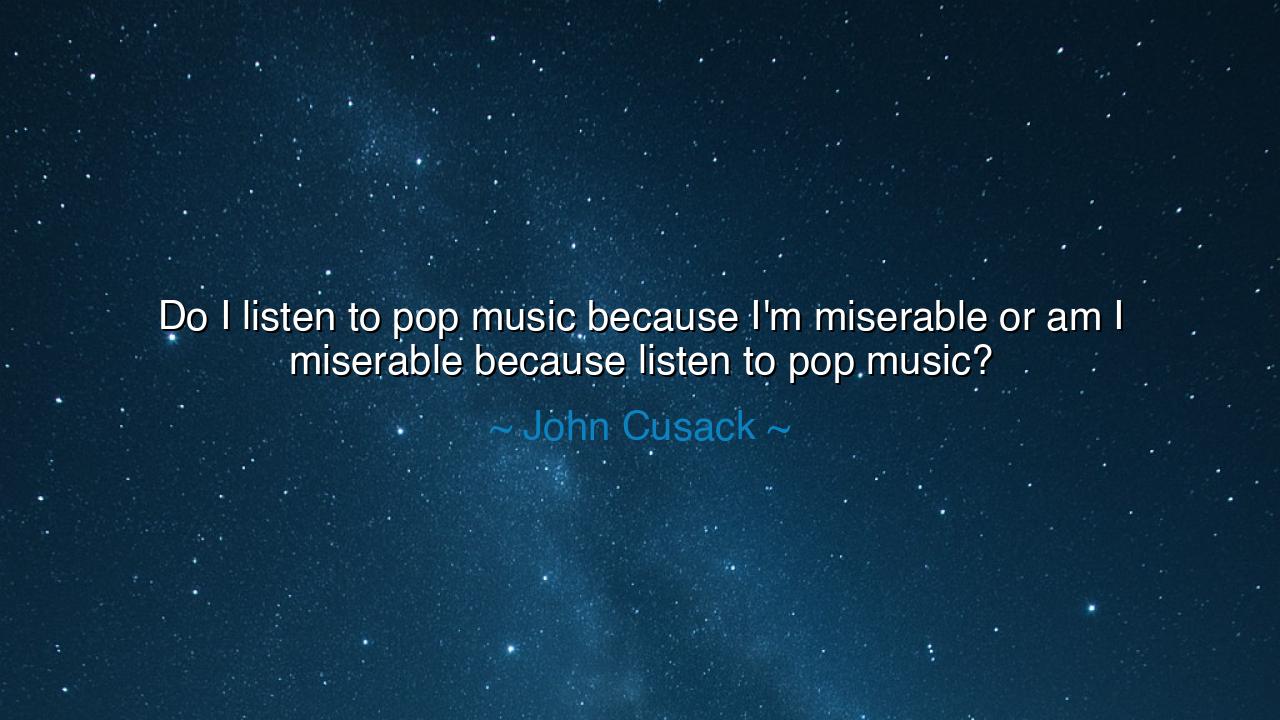
Do I listen to pop music because I'm miserable or am I miserable
Do I listen to pop music because I'm miserable or am I miserable because listen to pop music?






The words of John Cusack—“Do I listen to pop music because I’m miserable, or am I miserable because I listen to pop music?”—are posed like a riddle of the soul, half in jest yet carrying within it the weight of ancient philosophical inquiry. It is the eternal question of cause and effect: does art shape the heart, or does the heart shape art? Do we choose the songs because they echo our grief, or does the grief deepen because the songs return to us again and again like waves against the shore?
Cusack, through this playful paradox spoken in the film High Fidelity, captures the strange power of music over human emotions. Unlike the cold instruments of reason, music does not merely reflect—it resonates, amplifies, and sometimes imprisons. When a soul is already troubled, it may seek melodies that mirror its sorrow, for in hearing its pain expressed, it feels understood. Yet in that very act, the sorrow may grow deeper, entangled with the rhythm and words of the song. Thus pop music, simple and catchy though it may seem, can serve both as balm and as poison.
The ancients themselves wrestled with this. Plato warned that the wrong kind of music could corrupt the soul, just as nourishing harmonies could cultivate virtue. He saw clearly that music was no neutral force: it could heal, or it could wound. The Hebrews, too, in their psalms, turned to song both to lament and to praise. King David strummed his harp to soothe King Saul when the spirit of despair seized him—an ancient example of how music can calm the storm within. Yet we must also ask: had Saul steeped himself too long in songs of sorrow, would not his darkness have deepened?
History gives us other witnesses. Consider the Blues of the American South. Born from suffering, oppression, and loss, it became the cry of the broken. To sing the Blues was to survive, to endure. For some, it was release; for others, it was a well into which sorrow returned again and again. Likewise, in the 20th century, generations turned to pop music—whether ballads of heartbreak or anthems of longing—not only to express misery but to amplify it, to wrap themselves more tightly in its embrace. Thus Cusack’s question becomes not only personal but universal.
The meaning of his words, then, is not merely humorous but profound: music and the soul are locked in a cycle, each feeding the other. When joyful, we choose bright songs, and they lift us higher. When miserable, we seek sorrowful melodies, and they may either heal or deepen the wound. The danger lies in being unconscious of this cycle, in allowing music to dictate our spirit without discernment. Yet the blessing lies in using it wisely, in letting songs become medicine instead of chains.
The lesson for us is this: be mindful of what you feed your heart. Choose music that reflects not only who you are but who you wish to become. When grief comes, it is not wrong to seek songs that echo your sorrow, for in being understood, the soul can mend. But do not dwell endlessly there. Lift your spirit also with melodies of hope, with harmonies that remind you of joy and strength. Let your playlist become not only a mirror of your present, but a map toward your future.
Practically, this means cultivating awareness in what you listen to. Ask yourself: does this song heal me, or does it bind me tighter to despair? Does it lift my gaze to higher things, or does it keep me bowed to the earth? Fill your days with music that inspires courage, peace, and resilience. Use sorrowful songs as a momentary companion, but not as a permanent dwelling. For, as Cusack reminds us with humor and irony, there is a fine line between listening to pop music because you are miserable, and becoming miserable because you do.
Thus, let his words be remembered as more than a jest: they are a reminder of the sacred bond between music and the heart. Handle this bond with wisdom, and music will be your healer; neglect it, and it may become your jailer. The choice, as always, lies with the listener.






AAdministratorAdministrator
Welcome, honored guests. Please leave a comment, we will respond soon